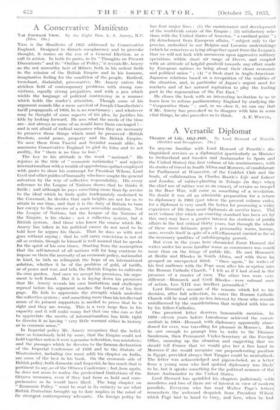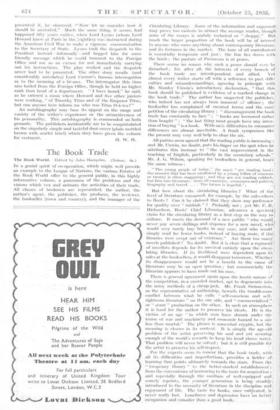A Versatile Diplomat
Theatre of Life, 1863-1905. By Lord Howard of Penrith. (Hodder and Stoughton. 21s.) To anyone familiar with Lord Howard of Penrith's dis- tinguished services as a diplomatist (particularly as MinisteT to Switzerland and Sweden and Ambassador to Spain and the United States) this first volume of his reminiscences, with its stories of travel in South Africa and Morocco, of candidature for Parliament at Worcester, of the Crabbet Club and the Souls, of collaboration in Charles Booth's Life and Labour and London, of rubber-planting in Tobago (in days whim the chief use of rubber was as an eraser), of service as troope in the Boer War, will conic as something of a revelation: No doubt it was all an admirable preparation for a return to diplomacy in 1903 (just where the present volume ends), for a diplomat is very much the better for possessing a wide,4 experience of life than most diplomats de earriere have. 'iii, next volume (for which all exacting standard has been set by this one) may have a greater interest for students of publia affairs in the last critical thirty years, but through the whole of these more intimate pages a personality warm, human,. sane, reveals itself in spite of a self-effacement carried as far ay the necessary qualities of autobiography permit.
But even in the years here chronicled Esme Howard (he writes under his more familiar name as commoner) was much; more than on the fringe of public life. He met Bismarck at Berlin and Rhodes in South Africa, and with them lui grouped an unexpected third. " Once again," he writes of his first audience with the Pope soon after his reception into the Roman Catholic Church, " I felt as if I had stood in ilia presence of a master of men. The other two were very different—Bismarck and Cecil Rhodes—were colossal men of action, Leo kill was intellect personified."
Lord Howard's account of the reasons which led to hit decision, after full reflection, to enter the Roman Catholic Church will be read with no less interest by those who remain uninfluenced by the considerations that weighed with him as by his fellow-Catholics.
One prescient letter deserves honourable mention. In 1893—eleven years before Lansdowne achieved the entente cordiale. in 1904—Howard, with diplomacy apparently aban- cloned for ever, was travelling for pleasure in Morocc 3. But he saw enough to prompt him to write to Sir Thomas: Sanderson, then Permanent Under-Secretary at the Foreign Office, summing up the situation and suggesting that we, should tell France that we would give her a free hand in Morocco if she would recognise our preponderating poi,ition in Egypt, provided always that Tangier could be neutralised.: The letter was acknowledged and pigeon-holed, as a !titer from a young man who had quitted diplomacy was likely!, to be, but it speaks something for the political acumen of the! future Ambassador to the United States.
Lord Howard has sprinkled his chapters judiciously withi anecdotes and two of them are of interest in view of modern' parallels. Everyone who has read Walter Page's letter/1 remembers the awkward despatch from , president Wilson. which Page had to hand: to Gray, and bow,- when he had
presented it, he observed-, "'Now-.let its consider how it should he answered. " Much the 'same thing, it seems, had' happened fifty years earlier, when Lord Lyons (whom Lord Howard knew at Faris in the2eighties) was' instructed during the American Civil War to make a vigorous communication to the Secretary of State. .Lyons took the despatch to the President instead—informally—and begged him for some friendly message which he could transmit to the Foreign Office and use as an excuse for not immediately carrying out his instructions. The plan worked and the despatch never had to be prpsented.' The other story recalls (and considerably antedates) Lord Curzon's famous interrogation as to the meaning of a be-ano. The interrogator this time, also hailed from the Foreign Office, though he held no higher rank than head of a department. " I have heard," he said, as he entered a room where Howard and five other juniors were working, " of Timothy Titus and of the Emperor Titus, but can anyone here inform me who was Titus 0-it-tes? "
An autobiography may base it appeal on the range and variety of the writer's experience or the attractiveness of his personality. This autobiography is commended on both grounds. The publishers .ineidentally are to be congratulated on the singularly simple and tasteful dust-cover (plain mottled brown with scarlet label) which they have given the volume



























































 Previous page
Previous page